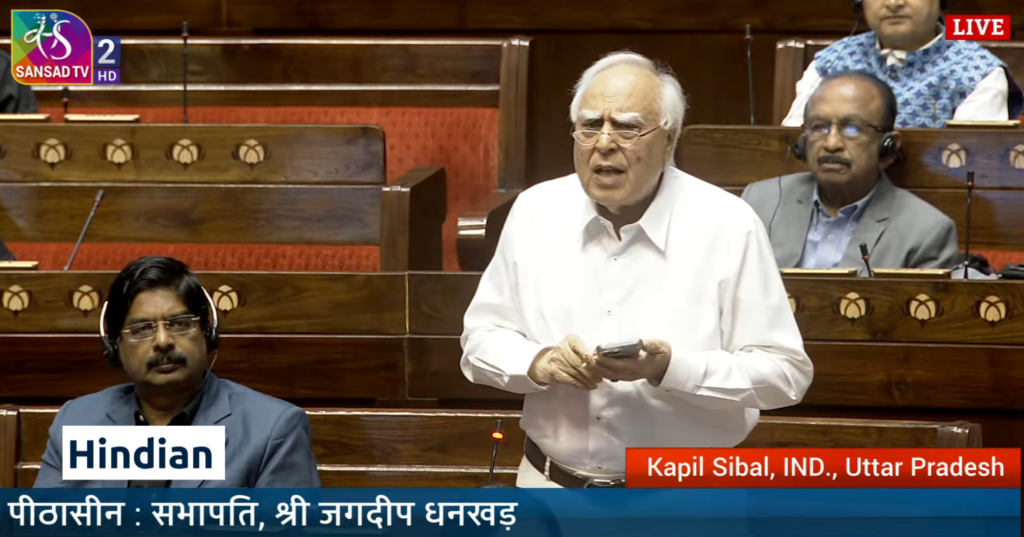In a recent debate in Parliament, senior advocate and Member of Parliament Kapil Sibal attempted to downplay concerns over the massive landholdings of Waqf Boards in India. Referring to figures from Tamil Nadu, Andhra Pradesh, and Telangana, he argued that Hindu temples in just three states own nearly 10 lakh acres of land, whereas Waqf properties across the nation account for only about 8 lakh acres. While his intent was to portray a supposed bias against Muslim institutions, the comparison he drew is deeply flawed, intellectually dishonest, and constitutionally dangerous.
India: A Hindu-Majority Nation Governed by Minority-Centric Laws
India is home to over 80% Hindus and 18–20% Muslims, yet the legal frameworks governing religious institutions are starkly asymmetrical. Hindu temples are managed by various state-controlled endowment boards, stripping devotees of autonomy over their sacred places and their resources. Meanwhile, Muslim Waqf Boards operate with full autonomy, often with government protection and funding, and increasing demands for greater independence under a separate Islamic Endowment framework.
False Equivalence: Waqf Properties Are Not Religious Institutions
It is critical to understand that Waqf properties are not houses of worship like mosques, nor are they exclusively religious in nature. Waqf is a civil concept in Islamic jurisprudence, wherein a person dedicates property “in the name of Allah”—not necessarily for religious use, but for civil, commercial, or charitable purposes.
Waqf properties include:
Residential and commercial real estate
Agricultural land
Shops, hotels, schools, graveyards, and even marketplaces
These properties are not managed as religious institutions. They are civil assets held in perpetuity, under Waqf Boards, and cannot be sold, transferred, or reclaimed—even if they involve government or private land.
Temples, on the other hand, are religious spaces where daily worship, rituals, festivals, and community faith are practiced. Comparing them to civil Waqf assets is like comparing a church to a shopping complex—it is categorically incorrect.
State Control vs. Minority Autonomy
Let us look at the actual governance structures:
In effect, the State acts as the trustee of Hindu temples, deciding how temple money is spent, how priests are appointed, and even whether ancient festivals should be celebrated or abolished. In stark contrast, Waqf Boards enjoy legal immunity and administrative freedom, even as they claim public and private lands, sometimes without public consent.
The Danger of One-Sided Autonomy
The demand from certain Muslim leaders for a separate Islamic Endowment Law—free from state oversight—reflects a desire for even greater control over Waqf properties. But here’s the contradiction:
Muslims want autonomy for their civil properties.
Hindus are denied autonomy over their sacred temples.
If true secularism means separation of religion and state, why does the state control only Hindu temples? Why should Hindu religious institutions be nationalized, while Waqf Boards function as autonomous civil bodies funded and protected by the government?
Dismantling the Hypocrisy
Kapil Sibal’s argument is a dangerous misdirection. It attempts to conflate sacred Hindu religious spaces with Islamic civil endowments—two entities that are structurally, functionally, and spiritually distinct. His comparison is not only invalid, but it also exposes the hypocrisy of India’s so-called secularism, where the majority is controlled and the minority is empowered.
This is not equality. This is not secularism. This is legalized discrimination.
It’s time India upholds one law, one standard, and one principle of justice for all communities. Either free all religious institutions from state control, or apply the same scrutiny and regulation across the board.
Hindus have tolerated this injustice long enough. The time to reclaim our temples—and our rights—is now.



